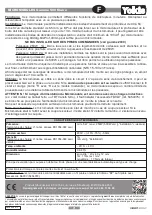
3-44
Overcurrent, Voltage, Synchronism Check, Frequency, and Power Elements
Date Code 20001006
SEL-351 Instruction Manual
presumes ABC system rotation. If voltage input connections are the same, but system rotation is
ACB, then setting SYNCP = 240 degrees (V
S
constantly lags V
A
by 240
°
). A similar translation
applies to delta-connected relays. For more information on setting SYNCP with an angle setting,
see the Application Guide
titled
Compensate for Constant Phase Angle Difference in
Synchronism Check with the SEL-351 Relay Family
.
Synchronism Check Elements Operation
Refer to Figure 3.26 and Figure 3.27.
Voltage Window
Refer to Figure 3.26.
Single-phase voltage inputs V
P
and V
S
are compared to a voltage window, to verify that the volt-
ages are “healthy” and lie within settable voltage limits 25VLO and 25VHI. If both voltages are
within the voltage window, the following Relay Word bits assert:
59VP
indicates that voltage V
P
is within voltage window setting limits 25VLO and 25VHI
59VS
indicates that voltage V
S
is within voltage window setting limits 25VLO and 25VHI
As discussed previously, voltage V
A
(for wye-connected voltage inputs) or voltage V
AB
(for delta-
connected voltage inputs) determines the frequency on the voltage V
P
side of the circuit breaker.
Voltage V
A
(or V
AB
for delta) is also run through voltage limits 25VLO and 25VHI to assure
“healthy voltage” for frequency determination, with corresponding Relay Word bit output 59VA.
Other Uses for Voltage Window Elements
If voltage limits 25VLO and 25VHI are applicable to other control schemes, Relay Word bits
59VP, 59VS, and 59VA can be used in other logic at the same time they are used in the synchro-
nism check logic.
If synchronism check is not being used, Relay Word bits 59VP, 59VS, and 59VA can still be used
in other logic, with voltage limit settings 25VLO and 25VHI set as desired. Enable the
synchronism check logic (setting E25 = Y) and make settings 25VLO and 25VHI. Apply Relay
Word bits 59VP, 59VS, and 59VA in desired logic scheme, using SEL
OGIC
Control Equations.
Even though synchronism check logic is enabled, the synchronism check logic outputs (Relay
Word bits SF, 25A1, and 25A2) do not need to be used.
Block Synchronism Check Conditions
Refer to Figure 3.26.
The synchronism check element slip frequency calculator runs if both voltages V
P
and V
S
are
healthy (59VP and 59VS asserted to logical 1) and the SEL
OGIC
Control Equation setting
BSYNCH (Block Synchronism Check) is deasserted (= logical 0). Setting BSYNCH is most
commonly set to block synchronism check operation when the circuit breaker is closed
(synchronism check is only needed when the circuit breaker is open):
BSYNCH = 52A
(see Figure 6.1 and Figure 7.4)
Summary of Contents for SEL-351
Page 14: ...Courtesy of NationalSwitchgear com ...
Page 16: ...Courtesy of NationalSwitchgear com ...
Page 40: ...Courtesy of NationalSwitchgear com ...
Page 74: ...Courtesy of NationalSwitchgear com ...
Page 146: ...Courtesy of NationalSwitchgear com ...
Page 186: ...Courtesy of NationalSwitchgear com ...
Page 220: ...Courtesy of NationalSwitchgear com ...
Page 304: ...Courtesy of NationalSwitchgear com ...
Page 340: ...Courtesy of NationalSwitchgear com ...
Page 380: ...Courtesy of NationalSwitchgear com ...
Page 450: ...Courtesy of NationalSwitchgear com ...
Page 506: ...Courtesy of NationalSwitchgear com ...
Page 528: ...Courtesy of NationalSwitchgear com ...
Page 534: ...Courtesy of NationalSwitchgear com ...
Page 536: ...Courtesy of NationalSwitchgear com ...
Page 550: ...Courtesy of NationalSwitchgear com ...
Page 562: ...Courtesy of NationalSwitchgear com ...
Page 570: ...Courtesy of NationalSwitchgear com ...
Page 584: ...Courtesy of NationalSwitchgear com ...
Page 602: ...Courtesy of NationalSwitchgear com ...
















































